|
|
|
Sort Order |
|
|
|
Items / Page
|
|
|
|
|
|
|
| Srl | Item |
| 1 |
ID:
180038
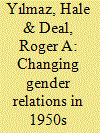

|
|
|
|
|
| Summary/Abstract |
This article examines patterns of gender relations in Ankara in the early 1950s. Based in part on the unpublished memoirs of Kemal Tanyolaç, who provided extensive details of his bachelor years in Ankara, this article explores a wide variety of relationships between men and women, from traditional marriage-oriented matchmaking and modern dating, through business relationships as work colleagues or landlord and tenant, to different types of illicit sexual relations. We look at changes in how men and women viewed each other and their relationships, and what effects that had on the ongoing social changes of the time. We argue that all types of relationships and the possibilities they entailed, including prostitution, need to be understood in complex, nuanced ways in order to understand the society that was emerging in post-Second World War urban Turkey.
|
|
|
|
|
|
|
|
|
|
|
|
|
|
|
|
| 2 |
ID:
180033
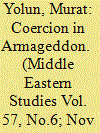

|
|
|
|
|
| Summary/Abstract |
The coercion that the Ottoman government and army established over its subjects during the Great War remained a significant factor in the war experience of the conscripts despite its limitations. Coercion is one of the most significant answers of why the Ottoman soldiers endured such a destructive warfare, in spite of war attrition, virulent epidemic diseases, malnutrition, maltreatment, thirst, and harsh climatic conditions. The Ottoman government exercised remarkable coercion over not only the conscripts but also society and economy, demanding an unconditional loyalty for the survival of the empire. Training, military penal code, religious ideology and narrative that legitimized the warfare were the instruments of coercion. This study will contribute to the social history of the Ottoman conscripts during the First World War.
|
|
|
|
|
|
|
|
|
|
|
|
|
|
|
|
| 3 |
ID:
180037


|
|
|
|
|
| Summary/Abstract |
The Bulgarian decision to deport 250,000 Bulgarian Turks to Turkey in August 1950 came as a shock to the Democratic Party (DP). As a party that had taken power only three months ago, the DP was not prepared to accept the influx of thousands of immigrants. The deportation initially challenged the DP’s legitimacy at home and abroad because the DP tried to exercise its political hegemony over the opposition and to become a member of the North Atlantic Treaty Organization (NATO). To counter criticism in Turkey and to protect its image in the international arena, the DP formulated a set of policies, ranging from diplomatic channels to anti-communist discourses and victimization of immigrant children and women. Based on primary and secondary accounts, the article argues that the deportation of Bulgarian Turks was a challenge – and simultaneously a source of legitimacy – to the DP at the beginning of its rule.
|
|
|
|
|
|
|
|
|
|
|
|
|
|
|
|
| 4 |
ID:
180041
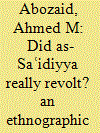

|
|
|
|
|
| Summary/Abstract |
The purpose of this study is to investigate and inspect the causes that prevented the (marginalised and isolated) society of Saʿid from rebelling against President Mubarak’s authoritarian regime, as the North did. Here I seek to present different interpretation of as-Saʿidiyya’s attitudes toward the 2011 uprising away from the Manichean ‘glorification’ versus ‘ignominy’, or ‘celebrating’ v. ‘contempt’ narrative that dominated the study of the Saʿid and as-Saʿidiyya role in the 2011 Arab uprising. My research is based on interviews, participant observation and ethnographic investigation which articulates the behaviour of peasants as political actors in this time of turmoil, While most sociological and anthropological studies of revolutions concentrate on cities and urban areas, this article focuses on a small town, Madinat Al-Fikriyya, and village, Munshaʿiat Al-Fikriyya in Al-Minya governate in Upper Egypt. Therefore, to understand the role of as-Saʿidiyya in the 2011 uprising, the article suggests three conceptual changes to this convention. Firstly, by putting peasantry communities within socio-political and socio-economic contexts; secondly by concentrating on understanding the dynamics of state-society relations, and lastly, exploring the role of security establishment and levels of penetration into the society in order.
|
|
|
|
|
|
|
|
|
|
|
|
|
|
|
|
| 5 |
ID:
180036
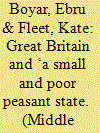

|
|
|
|
|
| Summary/Abstract |
Taking the Anglo-Turkish Trade and Navigation Treaty, concluded in March 1930, as its focal point, this article investigates the relations between Turkey and Britain after the signing of the Treaty of Lausanne and suggests that the failure of the British government to understand the fundamental importance of economic independence for the governing elite of the new Turkish republic, combined with its conviction that the Turkish economy was failing, undermined Britain’s ability to assess developments in the country and to position itself accordingly.
|
|
|
|
|
|
|
|
|
|
|
|
|
|
|
|
| 6 |
ID:
180040


|
|
|
|
|
| Summary/Abstract |
The recent renewal of the historiographical debate on the ‘global sixties’ has been made possible by moving away from an exclusive focus on 1968 in the United States and Western Europe as well as by increased scholarly attention to Third World revolutionary processes and the connections among them. However, scholarship on the 1960s in the Third World has mainly explored the circulation of strictly political agency (activists, governments, states, political movements), neglecting other important actors. Militant experts who transnationally coproduced an epistemology by and for the Third World are one such case. These politically committed professionals played a crucial role in postwar international forums and actively contributed to building postcolonial states. This article explores the case of postcolonial Algeria and its encounter with South American experts who were strongly committed to the Third World’s political and economic independence.
|
|
|
|
|
|
|
|
|
|
|
|
|
|
|
|
| 7 |
ID:
180039
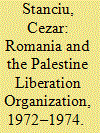

|
|
|
|
|
| Summary/Abstract |
This article reassesses Nicolae Ceaușescu’s relations with Yasser Arafat and the Palestine Liberation Organization in the first years after their first contact in 1972. Romania pursued an active policy in the Middle East conflict from 1967 onwards, trying to help establish contacts and carry messages between the parties involved, motivated by its anti-hegemonic foreign policy which considered that the conflict was the product of superpower rivalries in the region. In what concerned the Palestinian problem, Romanian decision-makers believed that the establishment of an independent Palestinian state, regardless of its territory, was the key to solving the conflict. In Ceaușescu’s view, both the PLO’s close ties to the USSR and its terrorist activities derived from the absence of statehood and once a Palestinian state was created, its struggle would have moved to a different level, facilitating negotiations and peace arrangements. Ceaușescu strongly advocated in favor of this vision during its contacts with Arabs, Israelis and Americans, trying to convince all sides of the advantages of such a scenario. This way, Romania contributed – as small as that contribution may had been – to the transformation of the PLO from a virtually terrorist organization into a future political actor in the region.
|
|
|
|
|
|
|
|
|
|
|
|
|
|
|
|
| 8 |
ID:
180035


|
|
|
|
|
| Summary/Abstract |
The purpose of this study is to analyse the construction of Turkish national identity as ‘we’ and ‘they’ in textbooks taught in the primary schools during the first years of the Republic of Turkey and the beginning of the 2000s in the context of narration of the Turkish War of Independence. The main material of the study consists of history and social studies textbooks. In this scope, four primary school history textbooks taught in the first years of the Republic of Turkey and four social studies textbooks taught at the primary school level at the beginning of the 2000s were selected. In selection of these textbooks care was taken to ensure that they were compliant with the curriculum in force at the time and that they were approved by the authorities responsible for education. Document analysis method was employed to gather subject data from the textbooks in question. The data gathered by this method were analysed using content analysis technique. The result of the analysis identified important and striking differences in the construction of Turkish national identity as ‘we’ and ‘they’ in the context of the Turkish War of Independence in textbooks from the two time periods.
|
|
|
|
|
|
|
|
|
|
|
|
|
|
|
|
|
|
|
|
|